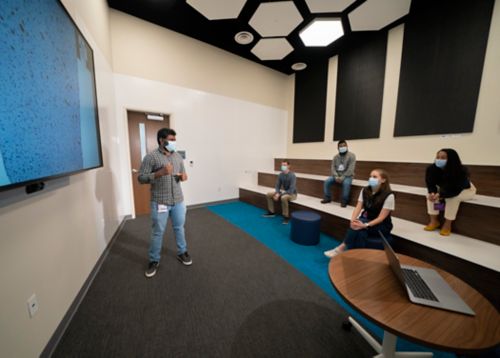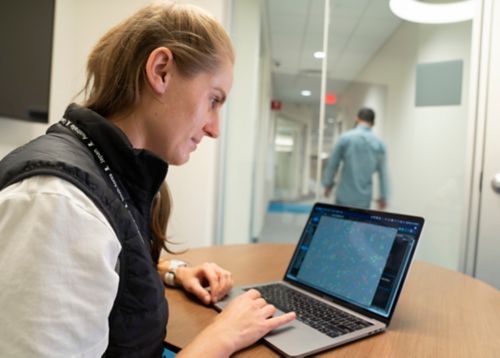St. Jude Family of Websites
Explore our cutting edge research, world-class patient care, career opportunities and more.
St. Jude Children's Research Hospital Home

- Fundraising
St. Jude Family of Websites
Explore our cutting edge research, world-class patient care, career opportunities and more.
St. Jude Children's Research Hospital Home

- Fundraising
Center for Bioimage Informatics
The Center for Bioimage Informatics (CBI) advances imaging-based research by using innovative AI and computer vision algorithms to analyze and quantify complex biological images.
OVERVIEW
The Center for Bioimage Informatics (CBI) provides expertise and resources to enable, accelerate, and enhance image-based research at St. Jude. Bioimage informatics integrates advanced artificial intelligence (AI), machine learning and computational methods to extract quantitative insights from bioimaging data, maximizing the impact of rapidly advancing imaging technologies. As imaging modalities grow increasingly sophisticated, our team delivers innovative image processing solutions. These include state-of-the-art image restoration, multimodal registration, precise segmentation, robust visualization and the development of deep learning-driven analytical tools.


IMPACT
The Center for Bioimage Informatics empowers imaging-based research across diverse modalities at St. Jude, including advanced light microscopy, electron microscopy and magnetic resonance imaging. With enterprise-scale GPU-equipped workstations and high-performance computing nodes, the CBI provides robust, scalable and efficient data processing. User-friendly web portals give researchers seamless access to self-service analytics on the institution’s computing infrastructure.
The multidisciplinary CBI team brings expertise in machine learning, deep learning, computer vision, quantitative image analysis and interactive data visualization. Advanced image data management, combined with custom-developed, open-source and commercial image processing software, strengthens these efforts.
CBI’s impact extends through active collaborations with research labs and departments across St. Jude. We also maintain close partnerships with microscopy and imaging facilities, ensuring seamless integration from data acquisition to analysis. These efforts contribute steadily to peer-reviewed research. Equally important is our commitment to the broader bioimage community: releasing open-source software packages, tools and resources that make advanced analysis methods widely accessible. These efforts ensure investigators benefit from innovative AI-driven bioimage analysis while fostering shared progress across the field.
Services and capabilities
- Consultation at the project planning stage for studies that involve biological imagery
- Image processing (deconvolution, denoising, intensity correction, etc.)
- Image registration
- Image segmentation and object tracking
- Image data visualization and quantification
- Image data organization and management
- Custom image analysis packages and infrastructure tool development
- Introductory and advanced courses on bioimage analysis
Equipment
- VIS Room: A dedicated visualization space with large interactive touch screens and a GPU-powered workstation for collaborative consultations, image review, and annotation.
- Workstations: Two high-performance Windows workstations with licensed software (e.g., Imaris), including a touch-enabled system for heavy annotation tasks.
- High-Performance Computing: Two dedicated CBI cluster nodes for large-scale processing, including a large-memory node (2TB RAM) and a GPU-enabled node with NVIDIA Tesla V100.
- Portable Devices: Three Microsoft Surface laptops configured for annotation and analysis, equipped with software such as ilastik, Anaconda, Fiji, and Napari.
Success Metrics
30+ & 41%
Contributed to over 30 publications, with 41% appearing in high-impact journals (IF ≥ 10)
Success Metrics
40 & 20
Collaborated with 40 Principal Investigators across 20 departments
Success Metrics
19 / year
Average of 19 project consultations per year
Success Metrics
Courses & Workshops
Multiple training sessions on bioimage analysis each year, ranging from introductory to advanced
Interim Director

- Ali Khalighifar
- Interim Director, Center for Bioimage Informatics
- Senior Image Data Scientist

- Jaison John
- Image Data Scientist

- Chen Li
- Sr. Image Data Scientist

- Catherine Rajendran
- Senior Computational Engineer

- Nishant Shakya
- Senior Software Developer

- Krishnan Venkataraman
- Senior Image Data Scientist